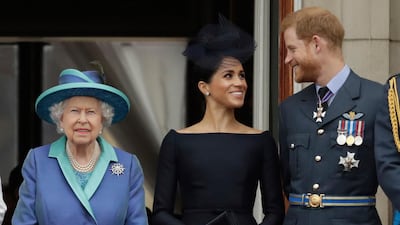Most people in Britain want the Duke and Duchess of Sussex stripped of their titles after their bombshell interview, according to a survey.
The poll commissioned by the Daily Mail showed that among those aged 45 and older, 62 per cent were in favour of the couple losing their royal status, with 21 per cent saying they should retain it.
The divide was smaller among younger people. For those aged 18 to 44, 38 per cent called for them to forgo their titles, while 36 per cent said they should keep their status.
The generational divide was also clear in a separate YouGov poll, which found that more than 60 per cent of under 25s believed the couple had been treated unfairly, compared with 15 per cent of those aged 65 and over.
Buckingham Palace broke its silence on the interview on Tuesday with a statement expressing the British royal family's sadness at the allegations levelled by the duke and duchess.
The palace said the claims about race that were raised by the couple in an interview with Oprah Winfrey would be addressed by the monarchy.
The statement said that while some "recollections may vary", the matters would be addressed privately and that the Sussexes would "always be much loved family members".
During the Winfrey interview the couple said that Prince Harry had been asked by an unnamed family member "how dark" their unborn son Archie's skin might be.
Prince Harry later clarified to Oprah that these comments were not made by his grandparents, Queen Elizabeth II and Prince Philip.
As the fallout from the interview continues, TV host Piers Morgan – a major critic of the duchess – quit the UK's top-rating morning show Good Morning Britain after he claimed he "didn't believe a word" the royal said during the interview.
Britain's media regulator Ofcom launched an investigation after it received 41,000 complaints about Morgan's remarks.
Concern about the allegations raised in the interview was also ricocheting across the Commonwealth.
Republicans in Australia renewed calls to remove the queen as the country’s head of state.
Former Australian prime minister Malcolm Turnbull said many Australians were merely fans of the queen, rather than the monarchy in general – making it unclear if they would embrace her successor.
“The issue is that Australia’s head of state should be an Australian citizen chosen by Australians, not the king or queen of the United Kingdom,” he told ITV on Wednesday.
Australian MP Matt Kean said: "Why is it easier for Harry to leave the monarchy than us? It's time to have a head of state in our own country focused on us, and only us."
During the interview, the duchess spoke of her distress over racism, particularly when viewed in the context of the Commonwealth. She noted that most countries in the 54-nation association have black majorities.
In the Caribbean, the Queen is still recognised as the head of state in Barbados, Antigua and Barbuda, the Bahamas, Belize, Grenada, Jamaica, Saint Kitts and Nevis, Saint Lucia, and Saint Vincent and the Grenadines. Barbados said last year that it will become a republic in November.
Prof Philip Murphy, director of the Institute of Commonwealth Studies, said the interview would “provide ammunition” for further Caribbean countries to ditch the monarchy.
He told The Times that the interview would "focus attention again on why states who have broken away from the British Empire should want to remain part of the Commonwealth and what is the Commonwealth's view on race and racism".
Monarchists in Canada also predicted the interview would harden opinions against the royal family after a recent poll found 55 per cent of Canadians thought the monarchy was “no longer relevant”.
Just 50 per cent of Canadians said the queen should be head of state, an all-time low and down from 61 per cent a year ago.
But New Zealand Prime Minister Jacinda Ardern said she did not believe the interview would help the republican cause in the country.
“I’ve said before that I’ve not sensed an appetite from New Zealanders for significant change in our constitutional arrangements, and I don't expect that's likely to change quickly," she said.
















